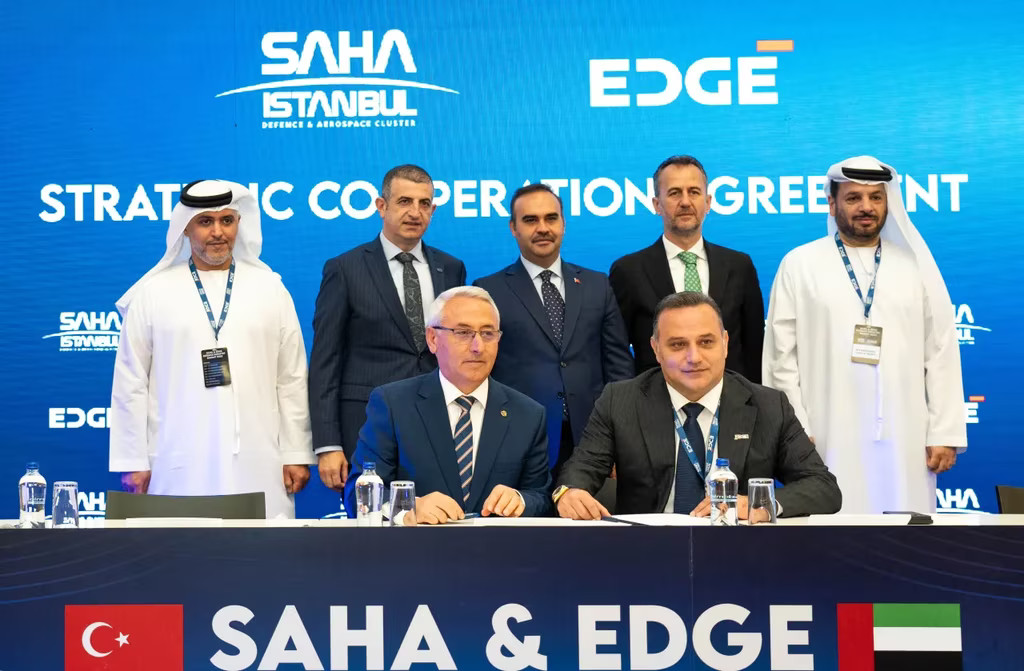
Turkey and the United Arab Emirates (UAE) have taken a significant step towards strengthening their defense industry ties, signifying a new era of regional collaboration. The move follows a history of political disputes, but a commitment to reconciliation in 2022 paved the way for these groundbreaking agreements. In July 2023, the two nations signed 13 deals worth an impressive $50.7 billion, with the UAE making substantial investments in Turkey’s defense and space sectors.
The heart of this collaboration was unveiled during a defense industry event in Ankara, Turkey, jointly organized by SAHA, an Istanbul-based defense expo business, and the Emirati conglomerate Edge Group. The event featured 10 subsidiaries of Edge Group and 125 Turkish defense companies, including prominent players like Aselsan, Turkish Aerospace Industries, Tusas Engine Industries, Roketsan, Baykar, Havelsan, and STM.
Haluk Bayraktar, SAHA’s President and Chairman of Baykar, emphasized the significance of these agreements, saying, “There is already a large-scale defense industry cooperation with the UAE. At this event, we signed letters of intent to upgrade this relationship with the participation of small and medium-sized [defense] entities. We are aiming at synergy.”
Turkey’s defense industry has been on the rise, and the Gulf Cooperation Council (GCC) countries have recognized its potential. Saudi Arabia, in particular, inked several agreements, including one with Turkey’s Baykar, to acquire cutting-edge AKINCI Unmanned Combat Aerial Vehicles (UCAVs). AKINCI is a formidable UCAV capable of air-to-ground and air-to-air missions, solidifying Turkey’s position as a top player in this technology.
The CEO of Baykar, Haluk Bayraktar, dubbed the Saudi deal as “the biggest defense and aviation export contract in the history of the Republic of Turkey.” This deal is estimated to be worth more than $3 billion and includes not only UCAVs but also training, technical support, logistic services, and joint production. Saudi Defense Minister Khalid bin Salman al-Saud stated that the deal aligns with their defense plan and aims to enhance the kingdom’s armed forces and defense capabilities.
Turkey’s defense industry has experienced remarkable growth since the early 2000s, evolving from a major weapons importer to a significant arms exporter. Stockholm International Peace Research Institute (SIPRI) data shows that Turkey’s arms exports have surged, increasing its share of the global arms market. The sales of UCAVs, such as the Baykar TB2 drones, have notably driven this growth.
The GCC countries, including Saudi Arabia, Qatar, and the UAE, have shown considerable interest in Turkey’s defense equipment. These countries have moved beyond merely purchasing Turkish military equipment and have begun engaging in partnerships, joint projects, and production agreements. These initiatives have diversified their security and defense ties, aiming to build indigenous defense industries.
Despite previous diplomatic tensions, the UAE recently offered a significant contract to purchase 120 Turkish Bayraktar TB2 drones, further strengthening their partnership. Qatar, Kuwait, and Oman have also been prominent clients of Turkish defense products, underlining the attractiveness of Turkey’s efficient and competitively priced equipment.
The cooperation between Turkey and the GCC states signifies enormous strategic and economic growth potential. By focusing on long-term, mutually beneficial “mega agreements,” these nations aim to enhance their immediate defense capabilities and nurture indigenous defense industries. This partnership is crucial for regional security and economic development, as it allows these countries to pursue self-reliance and strategic collaboration.
As Turkey continues to introduce advanced defense technologies, including its largest warship, the TCG Anadolu (L-400), and its fifth-generation fighter jet, KAAN, the opportunities for further defense collaboration between Turkey and the GCC nations are bound to expand. The region’s emphasis on indigenous defense industries, advanced UCAVs, and joint defense projects demonstrates their commitment to self-reliance and strategic cooperation.
The increased engagement of Gulf nations in defense collaboration with Turkey brings the potential for competition, especially given the reported rift between Saudi Arabian and Emirati leadership. While the actual utilization of these systems remains to be seen, these collaborations open up new opportunities for defense cooperation in the future. This is especially true as these countries become more involved in African affairs, which may lead to contracts that involve security requirements further down the line.
With the GCC countries emphasizing the localization of defense production and the transfer of technology and expertise, Turkish firms have shown their readiness to match these endeavors. STM, for instance, has expressed its willingness to cooperate with Gulf countries and transfer its technology to meet local requirements.
The burgeoning defense ties between Turkey and the GCC states mark a significant shift in regional dynamics, offering promising prospects for security and economic growth in the Middle East.
